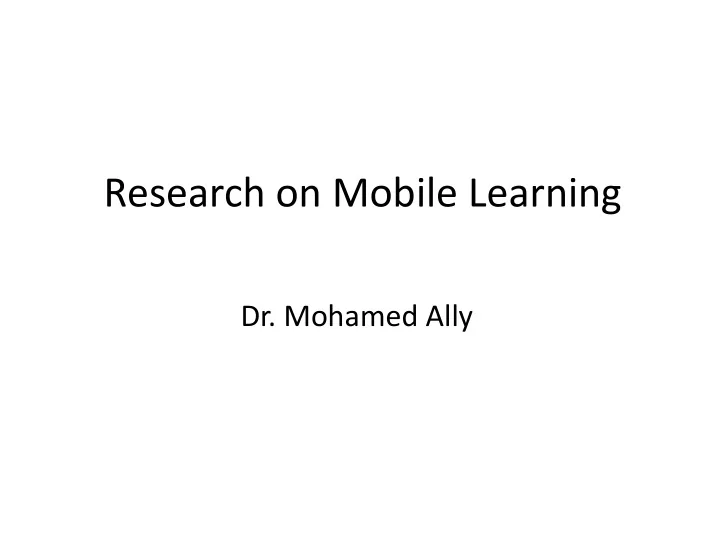

Research on Mobile Learning Dr. Mohamed Ally
Learning Outcome • Describe recent research in mobile learning.
Sample Mobile Learning Research Initiatives • ESL training for workers • Use of mobile devices by older adults • Learners use of mobile devices in forming community of practice in distance education • Mobile technology in libraries • State of mobile learning in Canada • Mobile learning in the workplace • Mobile Technology to deliver Physician Assistant training • Mobile access of health information system
Research Purpose (Wu et al., 2012) 5% 5% Evaluating the effects of mobile learning Designing a mobile learning system for learning 32% Investigating the affective 58% domain during mobile learning Evaluating the influence of learner characteristics in mobile learning
Distribution of Research Outcomes (Wu et al., 2012) 160 142 140 120 100 80 60 40 15 6 20 1 0 Positive Neutral Negative N/A
Benefits of Mobile Learning Klopfer & Squire (2008) • Portability – learners can take the technology to different sites and move around within a location. • Social interactivity – learners can exchange data and collaborate with other learners and the teachers. • Context sensitivity – can gather data unique to the current location, environment, and time, including both real and simulated data. • Connectivity – can connect mobile technology to other devices and to a common network that creates a true shared environment. • Individuality – can provide unique scaffolding that is customized to the individual’s interest.
State of Mobile Learning in Canada and Future Directions Mohamed Ally, Ph.D. Professor Athabasca University mohameda@athabascau.ca Agnieszka Palalas Athabasca University apalalas@athabascau.ca
PROFILE Canadian Provinces and Territories Surveyed CANADA Multiple locations 4 Yukon 1 Nunavut Northw est Territories 0 0 New foundland & Labrador British 1 Columbia Alberta 17 14 Manitoba 1 Quebec PEI 4 Saskatchew an Ontario 1 1 66 Nova New Scotia Brunsw ick 0 2
PROFILE How Innovative are Canadian Organizations in Mobile Learning? 7% 5% Innovators 22% 25% Early adopters Early majority Late majority Laggards 41%
CONCLUSION Effectiveness of M-learning 6% 25% Very effective Effective 41% Somewhat effective Not effective at all 28%
Recommendations for Canada • A national agency should be established or an existing agency should be used to coordinated mobile learning activities across Canada so that mobile learning developers, researchers, and mobile device manufacturers share best practices and research results. • Develop standards for mobile learning so that learning materials can be developed and shared between organizations. • Include mobile learning as a stream in the Tri- council research grant programs . • Develop training programs specializing in mobile learning .
Recommendations for Organizations • Integrate mobile learning in strategic, business, and educational plans . • Create partnerships between industries and educational institutions to collaborate on the mobile learning research and the development of learning materials. • Develop a research agenda for mobile learning . • Publish research studies so that all Canadians can have access to the results of the studies.
Research Needed • Most effective interfaces for mobile and virtual devices • Learning style of different cultures and mobile learning • What are the characteristics of mobile technology for different cultures? • Interactivity on mobile devices • How to design and deliver multimedia materials for mobile learning?
Research Needed cont’d • How to deliver learning materials to meet the needs of the nomadic learner who is always on the move? • How to deliver vocational training in a mobile world? • How to design content for the different age groups? • What are the characteristics of the next generation of mobile technology for learning?
More research on mobile learning is needed to allow teachers to implement mobile learning successfully
Recommend
More recommend